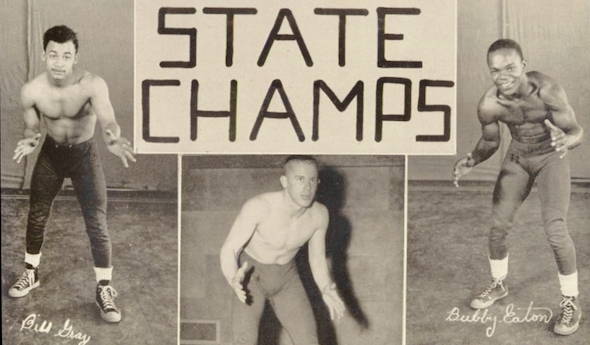
Old 5-A League Fueled Wrestling's Rise
June 29, 2020
By Ron Pesch
Special for Second Half
This latest quest into wrestling began with an inquiry, as these projects often do.
My work with the MHSAA – which includes the title ‘historian’ – is mostly a hobby that began many years ago. The diversion often gets me into press boxes and places the average sports fan doesn’t usually get to venture. Now and then, I get to talk into a microphone. But mostly, it is hours of digging; pouring through scrapbooks, yearbooks and newspapers, old and new, as I search for names, details and stories lost in time. The pursuit sometimes leads to awkward phone calls, e-mails and messages where I try to describe who I am and why I’m chasing a phone number for someone, a person’s mother or father, grandmother or grandfather.
I adore the chase and resolving mysteries. I love visiting libraries and schools and delight in connecting with people. I love filling in holes and connecting dots. I’m a computer guy by trade, focused on analyzing and aligning data. I equate sports searches to detective work, and for fans of old television, I’m like Columbo without the trench coat or cigar, always asking, “Just one more thing …”
Wrestling
My first visit to the sport was in junior high gym class. That’s when Coach Murphy paired me up against another undersized classmate. With the shrill of a whistle, we battled it out on a deep red colored mat – representative of one half of the red and grey school colors of Nelson Junior High. The struggle lasted for no more than a matter of seconds. With a slap of a mat, or perhaps another whistle, it was over. I lost by ‘fall’ – the gentler way of saying I was pinned.
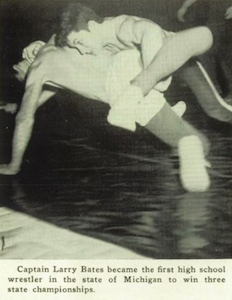 My second visit to the sport came in high school. That’s when the wrestling coach stopped me in the hall one day to suggest I join the wrestling team. Apparently, word of the skills I demonstrated at Nelson hadn’t travelled the half mile east from the junior high to the high school. Quickly recognizing this fact, I told him it might be counter-productive, as I wasn’t much of a wrestler. He was undeterred. Because I was still undersized, he said, I would likely win a fair number of matches. Many schools, it seemed, struggled to find someone to wrestle in the lower classes, and hence, would have to forfeit. I still turned him down.
My second visit to the sport came in high school. That’s when the wrestling coach stopped me in the hall one day to suggest I join the wrestling team. Apparently, word of the skills I demonstrated at Nelson hadn’t travelled the half mile east from the junior high to the high school. Quickly recognizing this fact, I told him it might be counter-productive, as I wasn’t much of a wrestler. He was undeterred. Because I was still undersized, he said, I would likely win a fair number of matches. Many schools, it seemed, struggled to find someone to wrestle in the lower classes, and hence, would have to forfeit. I still turned him down.
I give credit to the Coach Erickson. He was trying to involve a kid in athletics that wasn’t going to make the football, basketball or track team. But that bit of wisdom didn’t hit me until long after high school.
As the above may demonstrate, an extensive understanding of the intricate particulars of wrestling isn’t my strong suit. I’ve attended only one MHSAA Wrestling Final. That visit still remains among my favorite sports sights. The pageantry of the Grand March staged before the orchestrated pandemonium of the MHSAA wrestling championship combined with huge crowds and inspiring athleticism creates a spectacular event.
The Latest Project
Recently, a question, relating to past individual champions from the earliest days of the championships, arrived at the MHSAA office. The Association has awarded wrestling titles since 1948, and a list of team champions and runners-up from the beginning to the present appear on the MHSAA Website. Missing, however, are the names of the individuals who won championships between 1948 and 1960.
To find an answer, that meant a deep dive into newspapers, yearbooks and old wrestling guides to exhume the particulars from articles and agate, cross-referencing results, matching last names to first names, correcting spellings and occasionally schools when obvious errors have been made.
Technology has helped carve away some time and travel when embarking on such a project. Once, the only way to dig out such information was to travel to microfilm, and then spend hours scrolling past print. Today, thanks to some online archives, even during a global pandemic, we can visit a handful of Michigan newspapers via the internet. Tack on the ability to search the online cloud of information, intriguing elements intermittently bubble to the surface, transforming a standing list of names and schools to an account that brings at least some names to life.
The Beginnings
An initial look at the existing team championship listings revealed the first fact. For all intents and purposes, the earliest days of the MHSAA wrestling state championships served as a glorified meet for the members of the 5-A Conference. The league, comprised of Ann Arbor, Battle Creek Central, Jackson, Lansing Eastern and Lansing Sexton high schools, was where wrestling as a prep sport first gained traction in Michigan. Almost immediately, Greater Lansing established a stronghold on the sport that would last those first 13 years.
From 1948 to 1960, there was only one classification in which all schools, regardless of size, competed. In 10 of those 13 years, one of two Lansing high schools – Eastern or Sexton – won the state’s mat championship. In the three years when a Lansing team didn’t win, they finished as runner-up. Those three were part seven total of that baker’s dozen when either Eastern or Sexton finished second.
Growth in Michigan
The first championship tournament in 1948 involved around a dozen schools. While expansion into other schools commenced slowly, by 1957, wrestling had progressed into the fastest growing sport in Michigan.
“The sport blossoms into many new schools every year,” stated George Maskin in a January issue of the Detroit Times in 1957. “Best estimates are that at least 60 varsity prep teams now are in competition. The figure should come close to the 100 mark within a year or two. Prep wrestling has grown with such swiftness it now is necessary to hold regionals to determine qualifiers for the state meet.
“It is not the kind of wrestling one has watched on television or in some of the professional arenas around the state,” he added, trying to educate the public about the difference between the prep sport and the form of broadcast entertainment then popular. “Groans and grunts have no part in high school wrestling … nor does hair pulling or stamping the feet … or pointing a finger into the referee’s eye.”
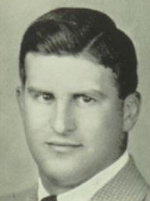 Coaches of wrestling noted that it was one of the few sports offered that gave equal opportunity to students regardless of their physical build. Separated into 12 weight classifications, running from 95 pounds and under up to the unlimited, or heavyweight division, there was a place for all.
Coaches of wrestling noted that it was one of the few sports offered that gave equal opportunity to students regardless of their physical build. Separated into 12 weight classifications, running from 95 pounds and under up to the unlimited, or heavyweight division, there was a place for all.
“Take the kid who weighs 95 pounds,” Ignatius ‘Iggy’ Konrad, a former wrestler at Michigan State and the coach at Lansing Sexton, told Maskin. “He’ll participate against a boy of similar weight. Thus a kid whose athletic possibilities might appear hopeless (in other sports) finds a place for himself in wrestling.”
As the sport continued to expand, coaches were still trying to explain the worth.
“Parents should try to understand the difference between television wrestling and high school and college wrestling,” Grandville coach Kay Hutsell told a Grand Rapids Press reporter in December 1960. “There is no comparison. TV is 100 percent acting.”
A state champion wrestler as a high school student in Illinois, where spectator interest and participation was far greater than in those early days of wrestling in Michigan, Hutsell twice lettered in the sport at Indiana University.
“Wrestling is a conditioner and perhaps develops the body better than any other sport. About the only way wrestling can educate the adults (in the western Michigan area about the sport) is through newspapers.” He felt people should come to “see for themselves.”
The Tournament
Lansing Sexton won the state’s inaugural team wrestling title, 54-43 over the Ann Arbor Pioneers, with the event run off on the mats of the University of Michigan in 1948. Both Floyd Eaton at 127 pounds and Carl Covert at 133 ended the year undefeated for the Big Reds. Five wrestlers from each school earned individual titles that first year. Jackson’s heavyweight, Norm Blank, scored a pin over Sexton’s Dick Buckmaster. The pair had split their two previous matches during league competition.
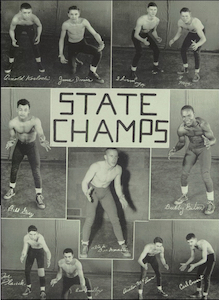 Ann Arbor grabbed the next two MHSAA team titles, both by a mere four points, first 60-56 over Sexton, then topping the Quakers of Lansing Eastern, 56-52, in 1950.
Ann Arbor grabbed the next two MHSAA team titles, both by a mere four points, first 60-56 over Sexton, then topping the Quakers of Lansing Eastern, 56-52, in 1950.
Eight wrestlers qualified for the final round for both Ann Arbor and Sexton in 1949, with five each earning championships. Both schools had three wrestlers finish in third and fourth place; hence the team title was awarded based on Ann Arbor tallying more pins. A total of 96 wrestlers from 11 schools participated in the tournament. Ted Lennox, wrestling at 95 pounds, became the first athlete from the Michigan School for the Blind to compete for an individual title but was defeated by Sexton’s Leo Kosloski. Lennox would later wrestle for Michigan State.
In 1950, nine Ann Arbor wrestlers advanced to the final round with six seizing championship medals, but only Sam Holloway repeated as champion from the previous year. Teammate Jack Townsley, who had won in 1949 at 112 pounds, finished second at 120.
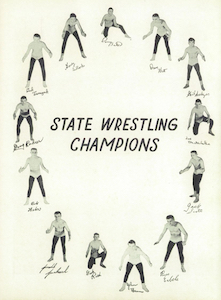 Eastern and coach Don Johnson grabbed the first of two consecutive titles in 1951, topping Ann Arbor, 56-52, with East Lansing finishing a distant third with 26 points. Pete Christ of Battle Creek Central became the first Bearcat (and only the second athlete from a school other than Eastern, Sexton or Ann Arbor) to bring home an individual wrestling title, with a decision over Lansing Eastern’s Vince Malcongi in the 140 classification. “The Bearcat matmen took fourth in the State,” according to the Battle Creek yearbook. “Mr. Donald Cooper took over the coaching duties when Mr. Allen Bush was called to the Marines.” (Bush would later serve as executive director of the MHSAA).
Eastern and coach Don Johnson grabbed the first of two consecutive titles in 1951, topping Ann Arbor, 56-52, with East Lansing finishing a distant third with 26 points. Pete Christ of Battle Creek Central became the first Bearcat (and only the second athlete from a school other than Eastern, Sexton or Ann Arbor) to bring home an individual wrestling title, with a decision over Lansing Eastern’s Vince Malcongi in the 140 classification. “The Bearcat matmen took fourth in the State,” according to the Battle Creek yearbook. “Mr. Donald Cooper took over the coaching duties when Mr. Allen Bush was called to the Marines.” (Bush would later serve as executive director of the MHSAA).
Johnson’s squad absolutely dominated the field in 1952, topping Sexton the next year, 68-43. Ann Arbor followed with 39 points. Seven Quakers – George Smith (95), Herb Austin (103), Jim Sinadinos (127) Bob Ovenhouse (133), Bob Ballard (138), Ed Cary (145) and Norm Thomas (175) – all won their final matches. Both Austin and Sinadinos were repeat champions.
Sexton flipped the table in 1953 with a 67-46 win over Eastern. Ten Big Reds competed for individual state championships among the 12 classifications, with five taking home titles. The Big Reds’ Ken Maidlow, jumping from 165 pounds to 175, and Eastern’s Ed Cary, who moved up to 154, both repeated as medal winners. In the heavyweight class, Sexton’s Ray Reglin downed Steve Zervas from Hazel Park. (Zervas, a two-time runner-up, later wrestled at the University of Michigan, then coached wrestling at Warren Fitzgerald for 34 seasons and served as mayor of Hazel Park from 1974 to 1986).
In 1954, Ossie Elliott of Ypsilanti and Henry Henson of Berkley became the first wrestlers from non 5-A schools to win individual state wrestling titles. Elliott, who had finished as state runner-up in 1953 at 133 pounds, downed Lansing Sexton’s Tom Holden in the same classification. Henson earned a decision over Lansing Eastern’s Ken Bliesener at 154 pounds. Eastern again returned to the winner’s circle, outdistancing Sexton, 60-44. Ypsilanti finished third with 34 points.
By 1955, athletes from 28 high school teams were battling for state team and individual honors on the mats at MSC’s Jenison Field House. As a senior captain, Lansing Eastern’s Larry Bates pinned four out of five opponents in the 112-pound class to become Michigan’s first wrestler to earn three state crowns. Bates grabbed his first title in 1953, competing at 95 pounds, followed by his second in 1954 at 103. Eastern picked up its second-straight team trophy, racking up 102 points on the way to a fourth crown in the eighth year of championships. For the first time, a non-5-A school finished second, as the Ypsilanti Braves grabbed runner-up honors with 84 points.
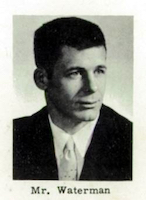 Coach Bert Waterman led Ypsilanti to the first of four championships during a 10-year span in 1956. Two Braves, Ambi Wilbanks and Walt Pipps, earned titles while three others finished second in their classifications. Ypsi had lost one dual meet during the regular season, to Lansing Eastern, by a slim three-point margin. With the 1967-68 school year, Waterman would embark on a 24-year career as coach at Yale University after posting a 192-35-4 mark in 16 seasons at Ypsilanti. A 1950 graduate of Michigan State, the former Spartans wrestler would join Eastern’s Don Johnson, Sexton’s Iggy Konrad, Fran Hetherington from the School for the Blind and two other high school coaches as a charter member of the Michigan Wrestling Hall of Fame in November 1978.
Coach Bert Waterman led Ypsilanti to the first of four championships during a 10-year span in 1956. Two Braves, Ambi Wilbanks and Walt Pipps, earned titles while three others finished second in their classifications. Ypsi had lost one dual meet during the regular season, to Lansing Eastern, by a slim three-point margin. With the 1967-68 school year, Waterman would embark on a 24-year career as coach at Yale University after posting a 192-35-4 mark in 16 seasons at Ypsilanti. A 1950 graduate of Michigan State, the former Spartans wrestler would join Eastern’s Don Johnson, Sexton’s Iggy Konrad, Fran Hetherington from the School for the Blind and two other high school coaches as a charter member of the Michigan Wrestling Hall of Fame in November 1978.
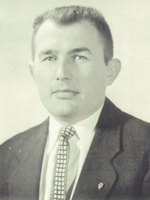 Runner-up in 1956, Eastern grabbed another title in 1957 topping Battle Creek Central, 93-89, in the tournament standings. It was a surprise “going away present” for Coach Don Johnson, who was stepping away after 10 seasons of coaching the Quakers to accept the assistant principal position at Eastern. Battle Creek had five wrestlers advance, and held a 56-48 lead over Eastern as the teams entered the final round. The Quakers’ Ted Hartman opened the day with a victory in the 98-pound weight class, helping Eastern post a 3-1 record in championship round matches. Sexton assisted with the Eastern victory when Norm Young defeated Battle Creek’s Bob McClenney in the 120 weight class. The Bearcats, who had five wrestlers in the finals, ended with two individual champs on the day and their highest finish in their 10 seasons of wrestling.
Runner-up in 1956, Eastern grabbed another title in 1957 topping Battle Creek Central, 93-89, in the tournament standings. It was a surprise “going away present” for Coach Don Johnson, who was stepping away after 10 seasons of coaching the Quakers to accept the assistant principal position at Eastern. Battle Creek had five wrestlers advance, and held a 56-48 lead over Eastern as the teams entered the final round. The Quakers’ Ted Hartman opened the day with a victory in the 98-pound weight class, helping Eastern post a 3-1 record in championship round matches. Sexton assisted with the Eastern victory when Norm Young defeated Battle Creek’s Bob McClenney in the 120 weight class. The Bearcats, who had five wrestlers in the finals, ended with two individual champs on the day and their highest finish in their 10 seasons of wrestling.
An All-American wrestler at Michigan State, Johnson would remain at Eastern throughout his education career, retiring as principal in 1983. The fieldhouse at Eastern was named after him in December 1984, fittingly just prior to the championship round of the annual Eastern High Wrestling Invitational.
Eastern again went back-to-back, topping Sexton, 88-57, with Ypsilanti third in the 1958 championship standings. The meet, culminating with 16 boys competing in each weight division – four each from regionals hosted at Battle Creek, Lansing, Ypsilanti and Berkley – was held at the Intramural Building at the University of Michigan. Both Eastern and Sexton advanced four wrestlers to the final round, with Eastern’s Gary Gogarn (95), Ron Parkinson (145) and Alex Valcanoff (154) earning titles. For Sexton, Fritz Kellerman (133) and Wilkie Hopkins (138) finished on top.
The 1959 championships, hosted at the new intramural building at MSU, found boys from 47 schools chasing medal honors.
“Points toward the team title are awarded one for each bout won, with an extra point for a fall,” noted the Lansing State Journal, explaining the mechanics of the tournament. “The big scoring chance comes (in the final round) with a first place netting 10 points, second 7, third 4 and fourth 2.”
Jackson and Sexton had tied for the 6-A Conference crown (the league renamed with the addition of Kalamazoo Central to the mix) and the race to the MHSAA title was expected to be a tight one. Jackson qualified seven for the semifinal round, with four advancing to the championships. The Big Reds sent five wrestlers to the last round. Vikings Ron Shavers (95), Nate Haehnle (145) and Don Mains (165) had each won matches, while Sexton’s qualifiers Tom Mulder (127) and Emerson Boles (175) had earned titles.
With one match remaining, Jackson trailed Iggy Konrad’s Big Reds by four, 67-63, as the Vikings’ Ed Youngs – the state’s reigning heavyweight champion – squared off with Sexton’s Mickey Devoe. Youngs grabbed a 3-1 decision to repeat, but the Vikings needed a fall in the match for a tie. Hence, the Big Reds eked out a single-point victory, 74-73, to escape with their third state mat title.
The results of the title round of the 1960 tournament, also won by Sexton, telegraphed how far the sport had come. Wrestlers from a dozen high schools squared off for honors in the title matches, with winners representing 10 cities. The Big Reds topped Ypsilanti 70-64, followed by Kalamazoo Central with 56 points. Eight other schools had scored at least 20 points in the tournament; 31 teams had scored at least a point. Tom Mulder of Sexton was the lone repeat champion.
With 112 schools now offering wrestling on their sports menu, the MHSAA split the event into two parts for the 1959-60 school year, with Class A set for the University of Michigan and Class B hosted by Michigan State University. The sport was now in full bloom.
 Ron Pesch has taken an active role in researching the history of MHSAA events since 1985 and began writing for MHSAA Finals programs in 1986, adding additional features and "flashbacks" in 1992. He inherited the title of MHSAA historian from the late Dick Kishpaugh following the 1993-94 school year, and resides in Muskegon. Contact him at [email protected] with ideas for historical articles.
Ron Pesch has taken an active role in researching the history of MHSAA events since 1985 and began writing for MHSAA Finals programs in 1986, adding additional features and "flashbacks" in 1992. He inherited the title of MHSAA historian from the late Dick Kishpaugh following the 1993-94 school year, and resides in Muskegon. Contact him at [email protected] with ideas for historical articles.
PHOTOS: (Top and 4) Lansing Sexton won the first MHSAA Finals in wrestling in 1948. (2) Eastern’s Larry Bates became the first three-time individual champion in MHSAA history in 1955. (3) The Big Reds were led by coach Ignatius Konrad. (5) Lansing Eastern kept the championship in the capital city in 1949. (6) Bert Waterman built one of the state’s top programs at Ypsilanti. (7) Don Johnson was the architect of Eastern’s program.(Photos gathered by Ron Pesch.)
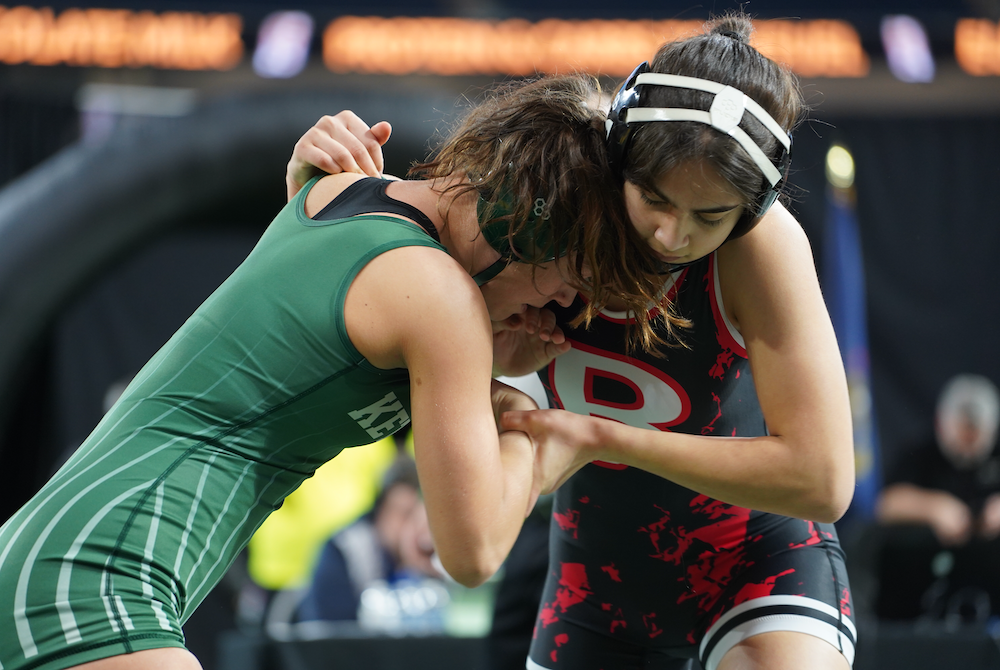
Manuel Sisters Bring Pair of Titles Back to Romeo, Just Getting Started
By
Scott DeCamp
Special for MHSAA.com
March 2, 2024
DETROIT – Romeo wrestling coach Justin Gides was a busy man Saturday afternoon at Ford Field.
He guided sisters Belicia and Kaili Manuel to back-to-back MHSAA Individual Wrestling Finals championships on the same mat in the 140- and 145-pound weight classes, respectively.
Sounds like the Manuel pipeline may be far from drying up, too, as Gides noted there are seven Manuel sisters in total.
“I think they’ve got me busy for the next 15 years,” he said with a hearty laugh.
Belicia Manuel, a sophomore, started it off with a tight 8-7 decision over Waterford Kettering senior Emily Medford. It was Belicia Manuel’s first Finals title and made her 23-0 on the season.
Kaili Manuel, a freshman, followed with a 14-4 major decision over Riverview Gabriel Richard junior Rihanna Venegas. That made Kaili’s season record 26-1.
Between the Manuels: Two championships and a combined 49-1 record.
“I was just thinking about my family coming and watching me, and I just really didn’t want to lose in front of them,” smiling Belicia Manuel said.
“Definitely a new experience,” she added. “Having this big crowd watching me is kind of scary, but we pulled through.”
When asked who holds the upper hand in family room tussles, Belicia took the more diplomatic approach and declared a tie.
Kaili has been wrestling since she was in kindergarten, while Belicia picked up the sport in third grade.
“They’re training partners, they work together all the time, every day. They’re always at each other’s mat, they notice the small things,” Gides said. “Honestly, I could probably make them the coach some days – they know so much. They’re so detail-oriented. There will be times I’ll go to yell something and they’re already yelling at their sisters, ‘You’ve got to do this, you’ve got to do this.’ They’re big students of the game.
“I mean, it’s crazy, man. They’re good kids, they train every day. They’re two of seven of them. There’s seven daughters, they all wrestle. They train year-round – they love it.”
100
Champion: Madison Nieuwenhuis, Plainwell, Soph. (18-0)
Medical forfeit over Olesya Mullins, St. Louis, Soph. (19-1)
Saturday’s Finals match was easier than last year’s for Nieuwenhuis, now a back-to-back champion, not that she wanted it to happen this way.
“I’m glad that I made it (to the championship bout), but a little sad that I didn’t get to wrestle,” said Nieuwenhuis, who like last year dealt with an injury on the way to winning a title.
In 2023, she had a foot injury. This season, it was a fractured bone in her wrist.
Nieuwenhuis hopes to be fully recovered in time for the World Team Trials.
“I guess just making it to the Finals (is the highlight this season),” she said.
105
Champion: Natalie Gibson, Remus Chippewa Hills, Jr. (18-2)
Fall, 0:54, over Tricia Pyrzewski, Gladwin, Sr. (42-5)
Pyrzewski had success against Gibson this season, but this time Gibson didn’t even give Pyrzewski time to think.
The bout was over in a hurry. Gibson captured her first championship after finishing runner-up at 105 pounds last season. This was her third Finals trip.
“Honestly, I think I just caught her and we’re super competitive with each other. She’s beat me twice already this year,” Gibson said. “I caught her in a perfect moment and I stuck her – it was super quick.
“We had a game plan and it kind of went with our game plan, but it just turned out a lot more perfect than we planned.”
Gibson has been wrestling for 11 years, picking it up from her older brother’s influence.
She hopes to be right back in the same spot next season.
“Honestly, I’m stunned -- a little bit in disbelief,” Gibson said. “Super proud of all the work and everything that my coaches and I have put in and that they continued to do with the support.
110
Champion: Nakayla Dawson, Westland John Glenn, Soph. (9-0)
Fall, 2:25, Cheyenne Frank, Oxford, Soph. (15-1)
Some believed that the Finals match at 110 pounds was going to be Dawson vs. Sky Langewicz of Algonac, with Langewicz having won Finals titles the last two years. But Frank earned an 8-4 decision over Langewicz in the Quarterfinals.
Dawson captured the 105-pound championship last season, so bumping up a weight class pushed her a bit.
“I mean, I feel like this year was a little bit more challenging because I bumped up a weight class, but it’s kind of the same,” Dawson said. “Girls, they’re just really flexible and they’re hard to get into turns and pins. But, yeah, it’s pretty much the same.”
Dawson did match up with Langewicz, but it was in the Feb. 18 Regional Final at Birmingham Groves, where Dawson earned an 8-5 decision.
Dawson made sure to keep the right mindset and stay focused in the Final. Her career goals are clear.
“Trying to go all four (years of winning championships),” she said.
115
Champion: Sunni LaFond, Gaylord, Jr. (30-6)
Decision, 13-9, over Gracey Barry, Grand Haven, Jr. (34-2)
LaFond broke through after runner-up finishes as a freshman and sophomore, but it was far from easy. She seemed to be in control of her Finals match Saturday, but Barry battled to the very end and made it very interesting.
“It was really intense. I did not think that it was going to be that tough to win it, but it was worth it in the end,” said LaFond, who absorbed two bloody noses in the bout.
After the match was over, LaFond ran up the stairs of the press risers and gave her mom a hug in the front row of stands. Moments later, she was greeted by well-wishers and wrestlers with whom she’s familiar.
“I didn’t feel nervous before, I just felt like it’s just another tournament, it’s not anything special,” she said. “I mean, yeah, it’s states, but it definitely feels really good.”
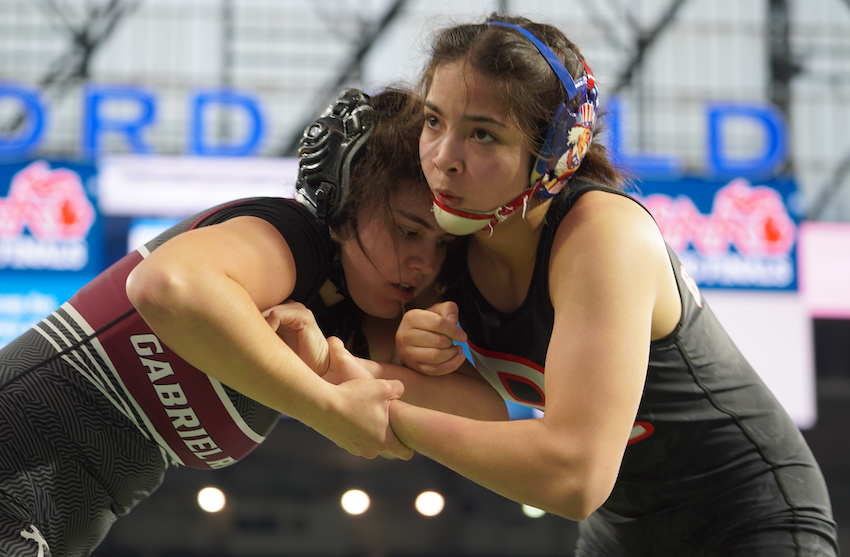
120
Champion: Lola Barkby, Sturgis, Jr. (17-3)
Decision, 4-2, over Faith Burgess, Grand Blanc, Jr. (25-1)
Barkby finished runner-up as a freshman and took fourth as a sophomore, but she said that different training and changing up her style yielded the results she was seeking.
You might say she kept her nose to the grindstone, so to speak. She had marks on her face to prove it.
“I’m not too happy about the mat burn on my face, but it’s a part of it,” Barkby said with a smile.
When Barkby placed second in 2022, she lost to eventual four-time state champion Angelina Pena in the 120-pound weight class.
This time, it was Barkby’s turn to leave the mat a champ.
“I mean, this is the best season that I’ve had and my team, we competed really well as a team this year,” Barkby said.
125
Champion: Tyler Swanigan, South Lyon East, Sr. (12-1)
Fall, 3:45, over Jamie Cook, DeWitt, Jr. (30-3)
Swanigan collected her second championship in three years. Previous experience seemed to pay off.
“My sophomore year was my first year competing at high school sports, so nerves were a lot higher coming into today being in the Finals three years in a row,” Swanigan said.
For the Finals match, Swanigan said that getting a lot of sleep, eating healthy, and drinking a lot of water helped.
She’s certainly poured enough time into it.
“I’m very happy this is the way I ended my high school career,” Swanigan said.
130
Champion: Angelina Pena, Milan, Sr. (16-2)
Fall, 3:25, Isabella Cepak, South Lyon East, Jr. (10-2)
Pena won a fourth-straight championship, including the third in a row since the MHSAA added a girls division for postseason competition. She captured the 120-pound title as a sophomore and 130-pound championship as a junior.
“I mean, it’s similar (to the other three) in the fact that I won and I held the same amount of respect for all of my opponents regardless of how they lose,” Pena said. “I think it’s different (in how) it gets harder every year, you know. All the girls are getting better, they’re training all year, and you’ve just got to keep training and keep putting in more work than they are.”
Pena is proud of the growth of girls wrestling at the high school and lower levels.
She said that her Milan coach, Adam Cabarello, launched a youth program at the school and he’s invited her to come to his practices.
“The more I come in, the more girls I see. We’ve got, like, seven or eight girls in there right now. It’s really nice to be able to mentor,” Pena said. “I think it’s just going up from here. Exponentially, we’ve already seen a giant increase in the amount of girls that are joining wrestling or making it to Ford Field. I think it’s great.”
135
Champion: Margaret Buurma, Fowlerville, Jr. (24-1)
Major Decision, 11-2, over Paisley Denault, Clarkston, Soph. (28-2)
Buurma is a three-time champion, also achieving the feat at 125 pounds last season and 115 as a freshman.
Former Fowlerville and University of Michigan standout Adam Coon has influenced her career.
“Quite a few times over the summer when we’re training freestyle stuff, he comes in, he works with us, he tells about his journeys through high school and college and then through all the Olympic stuff and World teams,” Buurma said. “He’s somebody who I strive to be like with his success in wrestling, but also his success in the academic field and his success as an overall person.”
Buurma said she felt a little more stress and anxiety coming into the tournament.
“In the end, it’s a wrestling tournament, and we’re here because we like wrestling,” she said. “Winning’s just always a bonus.”
155
Champion: Maddie Hayden, Caledonia, Soph. (11-0)
Fall, 0:49, Brynn Campbell, Holt, Sr. (30-7)
Hayden defended her title at 155 pounds, but she also overcame obstacles in the form of injuries.
“I think it’s definitely trusting my training. I had a couple of injuries, too, so I was out for a while. That was a big obstacle to overcome, too. I mean, I wanted to repeat, but my goal was also to overcome those obstacles as well,” Hayden said. “So just trusting in my training, trusting in my faith that I was going to be all right and that I could do it again because I did it last year.”
In late December or early January, she broke her fingers. Hayden was back on the mat for a week before she hyperextended her elbow.
The injuries may have seemed like a curse to some, but Hayden took them on as a challenge. They certainly didn’t seem to hinder her performance Saturday.
“Like, going into Regionals and state, I had only been wrestling a week in the past two months,” she said. “It was definitely scary coming in here with not a lot of wrestling, but that was also a fun thing. ‘Let’s see how good I could do off of not a lot of practice.’”
170
Champion: Maddison Ward, Niles Brandywine, Jr. (37-1)
Fall, 5:48, Heaven Cole, Kalamazoo Loy Norrix, Jr. (17-2)
The bear hug with her coach said it all immediately following Ward’s pinfall.
She summarized it with one word: “Amazing.”
“Like, I’ve been waiting for it for the longest time,” she said.
In her first Finals appearance, Ward pinned her way through the bracket.
“This year made it special because I knew I would be able to make it into the Finals this year, and it’s just exciting to be able to wrestle in the Finals – I’d never done it before,” she said.
190
Champion: Sabrina Nauss, Brighton, Sr. (9-0)
Fall, 1:35, Gabriella Allen, Marcellus, Sr. (25-3)
Nauss became just the third four-time state champ in Michigan high school girls wrestling history.
In another historical note, two years ago she was the first female to win an Individual Finals match at Ford Field.
“Just a lot of emotions right now. Excited. I’m excited about what’s to come next, but I’m also sad for what I’m leaving behind,” she said. “I’m leaving one of my coaches, who has coached me from the start until the very end. … I’m excited. I’m excited for the future. I’m excited for college, and there’s just so much going on right now.”
Nauss collected the 170-pound title in 2022 and 190-pound crown in 2023 at MHSAA Finals. Her freshman year, she won a championship at the Michigan Wrestling Association state tournament.
She was all business in Saturday’s Final, taking charge and trying to put it away early.
“I mean, I just wanted to come in and get the job done,” she said. “Like I’ve said before, this is a business trip for me. This is my job, so when I come in, I want to come in hard. I want to get the first takedown and I’m trying to score the most points, so coming in with a pin was my ideal for finishing the job.”
235
Champion: Madasyn Frisbie, Belding, Jr. (6-1)
Sudden Victory, 4-2, over Braelyn Flemming, Spring Lake, Jr. (18-4)
The now two-time champion Frisbie has been through her share of pain on the wrestling mat.
“I’ve had a really tough season because I missed the majority of my season because I dislocated my (right) shoulder,” Frisbie said. “When I got to come back, it was probably the best day of my life.
“And then I went to Regionals and lost in the Regional Finals, and I never want to have that feeling of losing again. I mean, that’s just what drove me. I decided I wasn’t going to lose, so I didn’t.”
PHOTOS (Top) Romeo’s Belicia Manuel, right, takes on Waterford Kettering’s Emily Medford in Saturday’s championship match at 140 pounds. (Middle) Kaili Manuel, right, works to gain control during her 145-pound championship match against Riverview Gabriel Richard’s Rihanna Venegas. (Click for more from High School Sports Scene.)

